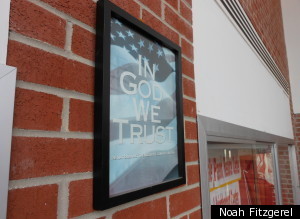The following post first appeared as an article in The A-Blast, Annandale High School's award-winning student newspaper.
The Virginia Code is a document of violations. Among them is a violation of students' religious freedom. At public schools across Virginia, students walk by this violation every morning. It is manifest in a harmless-looking framed document. It is the words "In God We Trust."

I am a proud adherent of Reform Judaism. However, my God is not the God that the sign alludes to. Neither is it to the God to whom my Muslim friends worship. And of course, it is simply an offense to my peers who have decided that faith should have no role in their lives. In fact, it is not an allusion to the God who most of my Christian friends worship. To all of us, this sign alludes to a God only supported by ultraconservative Christian fundamentalists, whose God vilifies any person who intends to create a separation between church and state.
Moreover, this sign is a violation of the Establishment Clause of the First Amendment. Manifest in the words "Congress shall make no law respecting an establishment of religion," the Establishment Clause prevents government from favoring one religion over another. This sign is a clear establishment of religion, offending all of those who are protected from government interference with their respective religions.
However, even if this sign alluded to a God who I believed in, it would have no place in a public school that contains adherents (and non-adherents) to a multitude of religions. I can't believe that students as diverse as those in Virginia must be subjugated to such a God every day.
In June 2002, the Ninth Circuit Court of Appeals banned the recital of the Pledge of Allegiance from all public schools. Shortly thereafter, on July 1, 2002, the Virginia legislature passed a set of laws that required schools to "prominently display the national motto 'In God We Trust.'" Thus was the birth of the sign that haunts us today.
I am ashamed of the fact that I live in a state that prides itself on marginalizing minority religions. Whether through the endorsement of days of prayer (passed in 1997) or the inhibition of students' religious freedom, Virginia seems to pride itself on being "God's state." However, I hold a hope that the culture of Richmond has changed in a decade.
To those fundamentalists who might be reading this post, I write that you have every right to worship such a God, but not to impose such a God on others in a public building. I have worked in political advocacy to ensure, no matter the degree of interpretation, that you have a fundamental right to openly worship such a God. But I have fought against attempts to invoke such a symbol over the heads of unassuming students, and will continue to do so.
In a state that prides itself on fostering diversity, it is simply ironic that Virginia facilitates such a law. While it would be illegal to take down the sign that holds a dark reminder of the perpetual violation of our precious separation between church and state, it is necessary to make a change. Such a course of action can only occur through legislation in Richmond. Therefore, because it is legislative season the year before an increasingly important election, such a change can and should be made.
Otherwise, Virginia might continue to live up to its self-proclaimed reputation as "God's State," which casts a negative image on us all. However, there is still time. As students, we are told that we have limited access to politics. Contact your representative, and tell him or her that the God you believe in (or do not believe in) belongs in your personal life, not as a framed motto in the entryway of a public building. In doing so, you will defy such fallacious social constraints.
Our right to religious freedom, ultimately, depends on it.
